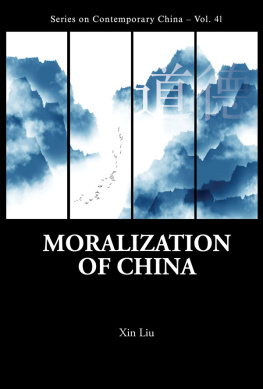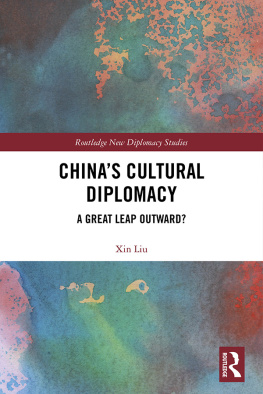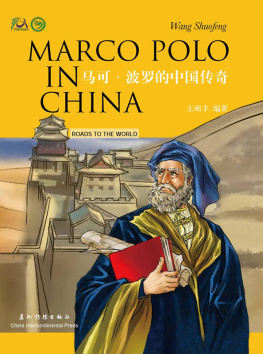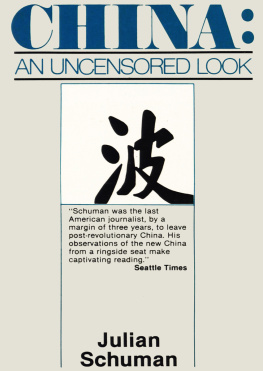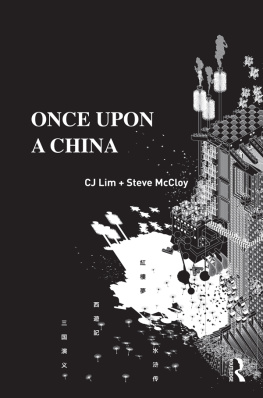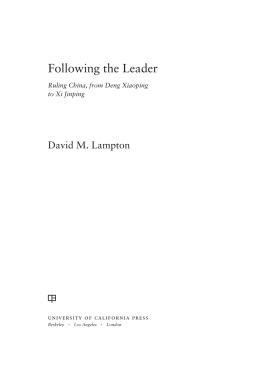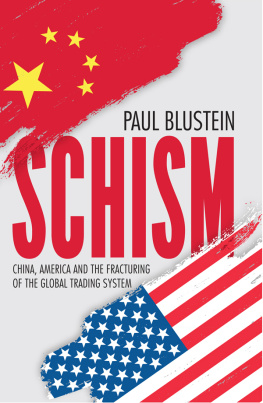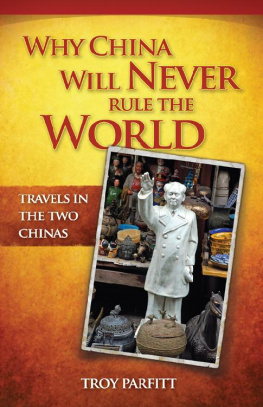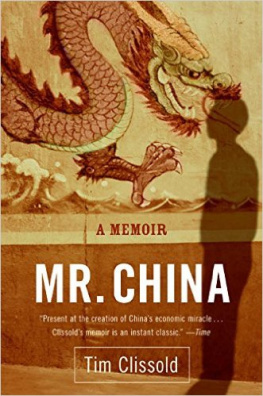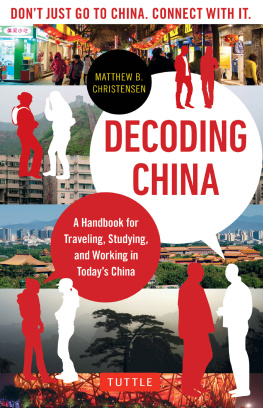
Series on Contemporary China
(ISSN: 1793-0847)
Series Editors: Joseph Fewsmith (Boston University)
Zheng Yongnian (East Asian Institute, National University of Singapore)
This series showcases the most significant and lasting contributions to scholarship in the studies of Chinas politics, society, and culture whether for general readers or specialists. Each of the volumes is a quality work by a leading scholar or scholars in the field and may take the form of a research monograph, a multi-author edited volume, a conference proceeding, a textbook, or an annual review, among others. While the focus is on China, the series does not lose sight of the interplay of other regional and global forces and their influence and impact on China.
Published*
Vol. 41Moralization of China
by Xin Liu
Vol. 40Social Construction in Contemporary China
edited by Xueyi Lu
Vol. 39Chinas Economic Statecraft: Co-optation, Cooperation, and Coercion
edited by Mingjiang Li
Vol. 38The Domestic Dynamics of Chinas Energy Diplomacy
by Chi Zhang
Vol. 37Understanding Chinese Society: Changes and Transformations
by Eileen Yuk-ha Tsang
Vol. 36Health Policy Reform in China: A Comparative Perspective
by Jiwei Qian & ke Blomqvist
Vol. 35Township Governance and Institutionalization in China
by Shukai Zhao
Vol. 34The World Turned Upside Down:
The Complex Partnership between China and Latin America
by Alfredo Toro Hardy
Vol. 33China and East Asia: After the Wall Street Crisis
edited by Peng Er Lam, Yaqing Qin & Mu Yang
Vol. 32East Asia: Developments and Challenges
edited by Yongnian Zheng & Liang Fook Lye
Vol. 31Social Structure of Contemporary China
edited by Xueyi Lu
*To view the complete list of the published volumes in the series, please visit:
http://www.worldscientific.com/series/scc

Published by
World Scientific Publishing Co. Pte. Ltd.
5 Toh Tuck Link, Singapore 596224
USA office: 27 Warren Street, Suite 401-402, Hackensack, NJ 07601
UK office: 57 Shelton Street, Covent Garden, London WC2H 9HE
Library of Congress Cataloging-in-Publication Data
Names: Liu, Xin, 1957 author.
Title: Moralization of China / by Xin Liu, UC Berkeley.
Description: New Jersey : World Scientific, 2017. | Series: Contemporary China ; Volume 41 |
Includes bibliographical references.
Identifiers: LCCN 2017029433 | ISBN 9789813230224 (hc : alk. paper)
Subjects: LCSH: Social change--China--History--21st century. | Social evolution--China-
History--21st century. | Technological innovations--China--History--21st century.
Classification: LCC HN733.5 .L887 2017 | DDC 306.0951--dc23
LC record available at https://lccn.loc.gov/2017029433
British Library Cataloguing-in-Publication Data
A catalogue record for this book is available from the British Library.
Copyright 2018 by World Scientific Publishing Co. Pte. Ltd.
All rights reserved. This book, or parts thereof, may not be reproduced in any form or by any means, electronic or mechanical, including photocopying, recording or any information storage and retrieval system now known or to be invented, without written permission from the publisher.
For photocopying of material in this volume, please pay a copying fee through the Copyright Clearance Center, Inc., 222 Rosewood Drive, Danvers, MA 01923, USA. In this case permission to photocopy is not required from the publisher.
For any available supplementary material, please visit
http://www.worldscientific.com/worldscibooks/10.1142/10712#t=suppl
Desk Editors: Chandrima Maitra/Lixi Dong
Typeset by Stallion Press
Email:
Printed in Singapore
For the Intelligent Few
Preface
Humanity and benevolence, thus based on selfish fear of punishment and hope of reward, may have little ethical value in our eyes; yet their mere existence in a country where culture has not yet taught man to cultivate goodness for its own sake, may be greeted as a blessing. An ethical system built up in Demonism, that is to say, on a basis which we condemn as unsubstantial and hollow, as mere untruth and superstition created by the darkest ignorance claims the serious attention of the student of the human race and its culture. Certainly that system is more than a Sinological curiosity. Because of the twenty or more centuries during which it has existed, and because of its imposing background the religion of Universe that strange ethical system is, I think, an important phenomenon in the history of the influence of religion on civilization. But this as it may, it cannot be denied that Chinese demonocracy, in spite of the falsity of its basis, has up to this hour done admirable service in East Asia in tempering mans bad instincts.
J. J. M. de Groot
Religion in China
These raucous words by de Groot, with a missionary lamp in hand, must echo a prevailing sentiment in the breast of an enormous population in todays China. There is no longer the old boast of Maos mass line politics which extolled the masses and grabbed their hearts and reigned their violence, and tranquility of society is now thought securable only by muscular men in uniforms. From the decaying grave of de Groot buried a long time ago, there comes an echo of the same sound with the only difference being the official change of mind in adopting an FBI approach.
If de Groot were to revisit China today, what would he say? Would he rather condemn the party-state for all the social evils prevailing in todays China, like certain political dissidents have done? Whatever his view, a difference between then and now exists: there is a strong, unified China under the control of a party-state as its sole legitimate authority. True it is that todays anxiety does not come from the fear of regional or local wars among malicious warlords, a persisting worry of life struggles prior to the establishment of the Peoples Republic. Their psychic instability might have been intensified, but corrupt officials or new business despots or any local mafia types, however scary or malicious, are never comparable to the chaotic past prior to 1949. The comparability of the form cannot be extended to its content in this case. Most people are indeed complaining about the social reality they live in, but they rarely realize that it is also the reality they have participated in making. Their anxiety and complaints, undeniably true, are accompanied by their pride for and boast of the countrys material achievement, an official eulogy in and for itself. Their hearts are full of pride, which is more their pleasure than their reward. Out of the same complaining multitude, therefore, there came a strong patriotic feeling, comparable only with the feeling invoked by the Patriotic Acts. Such a nationalistic passion, a handy tool for governing, has never been so palpable that it can easily command passions whenever they are needed. Hence came a new mass habit: a huge crowd would gather in the Heavenly Peace Square, in Beijing, on the eve of the National Day (1st of October), with many young people spending their whole night in the square, waiting to see how Chinas national red flag arises with the rising sun. A ritual, which should have made a genuine Confucian scholar envy, has gained such a symbolic power over the hearts of many who are otherwise bitter or critical. Despite their complaints that furnish daily experience, the material achievement of the country, the dream of its becoming a world power, has made everyone, poor or rich, feel so refreshed when waking up in the morning. This is an old dream for a new morning; the pleasure-seeking multitude are torn by the constant swings of their emotions from collective pride to individual suffering real or imagined and back. The red flag is the same flag, but now endowed with a new meaning. Fright and pride, which have alternated in the chests of a massive people, make up the new countenance of todays China not the same picture painted by de Groot but resembling it in several essential colors.



